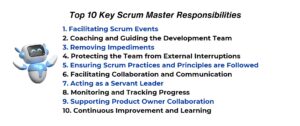In the fast-paced world of software development, agile methodologies have revolutionized the way teams approach projects. And at the heart of successful agile implementation stands the Scrum Master.
But what does it take to excel in this role in 2023?
What are the key responsibilities that can propel your agile journey to new heights?
Top 10 Key Scrum Master Responsibilities :
In this blog post, we will explore the 10 essential Scrum Master responsibilities that you need to know to thrive in the dynamic landscape of agile project management.

1. Facilitating Scrum Events
One of the primary responsibilities of a Scrum Master is to facilitate various Scrum events, including Sprint Planning, Daily Scrum, Sprint Review, and Sprint Retrospective. The Scrum Master ensures that these events are properly organized, time-boxed, and focused, fostering collaboration and maximizing team productivity.
2. Coaching and Guiding the Development Team
A Scrum Master acts as a coach and mentor to the development team, helping them understand and embrace Scrum principles and values. They facilitate self-organization within the team, encourage cross-functional collaboration, and remove any impediments that hinder progress.
By fostering a culture of continuous improvement, the Scrum Master empowers the team to deliver high-quality results.
3. Removing Impediments
Identifying and eliminating obstacles that impede the team’s progress is a crucial responsibility of a Scrum Master. Whether it’s dealing with organizational bureaucracy, resource constraints, or conflicts within the team, the Scrum Master takes proactive measures to ensure a smooth workflow and optimal productivity.
4. Protecting the Team from External Interruptions
A skilled Scrum Master shields the development team from external distractions and interruptions. They create a conducive environment where the team can focus on delivering value without undue interference.
This involves managing stakeholder expectations, shielding the team from unnecessary meetings, and promoting a sustainable pace of work.
5. Ensuring Scrum Practices and Principles are Followed
The Scrum Master plays a vital role in ensuring that the Scrum framework and its associated practices are followed diligently. They guide the team in adhering to Scrum ceremonies, artifacts, and roles, while continuously encouraging improvement and adaptation.
The Scrum Master acts as a custodian of Scrum values and promotes transparency, inspection, and adaptation.
6. Facilitating Collaboration and Communication
Promoting effective collaboration and communication within the team and with stakeholders is a key responsibility of a Scrum Master. They facilitate regular communication channels, encourage open discussions, and ensure information flows seamlessly between team members.
By fostering a culture of transparency and trust, the Scrum Master enhances the team’s ability to deliver high-quality products.
7. Acting as a Servant Leader
A Scrum Master embodies the principles of servant leadership. They serve the team by removing obstacles, empowering self-organization, and facilitating decision-making processes.
The Scrum Master leads by example, promoting a culture of mutual respect, continuous learning, and collective ownership of project success.
8. Monitoring and Tracking Progress
To ensure project success, a Scrum Master monitors and tracks the team’s progress against Sprint goals and overall project objectives. They utilize relevant metrics and tools to provide insights into team performance, identify areas for improvement, and facilitate data-driven decision-making.
9. Supporting Product Owner Collaboration
The Scrum Master actively supports the collaboration between the development team and the Product Owner. They help facilitate effective backlog management, assist in refining user stories, and ensure clear communication of product vision and priorities.
By fostering a strong partnership, the Scrum Master enhances the team’s ability to deliver value-driven products.
10. Continuous Improvement and Learning
Last but not least, a Scrum Master is committed to continuous improvement and learning. They seek opportunities to enhance their own knowledge of agile practices and frameworks, staying up-to-date with industry trends and advancements.
Additionally, the Scrum Master encourages the team to embrace a mindset of continuous improvement. They facilitate retrospectives to reflect on what worked well and what can be improved in each sprint. By fostering a culture of learning and adaptation, the Scrum Master helps the team to evolve and deliver better results with each iteration.
As businesses embrace agile methodologies to stay competitive in a rapidly changing market, the demand for skilled and knowledgeable Scrum Masters will only grow. By mastering these responsibilities, Scrum Masters can elevate their effectiveness and contribute significantly to the success of their teams and organizations.
In summary, being a Scrum Master is much more than just a job title; it is a dynamic and multifaceted role that requires a combination of leadership, facilitation, coaching, and continuous improvement skills. Embracing these responsibilities in 2023 will empower Scrum Masters to navigate the complexities of agile projects and drive exceptional results in an ever-evolving digital landscape.
Discover new heights in your product management skills with IIM-V’s Product Management certification! Our comprehensive course is tailor-made to ignite your journey in product management with industry expertise and practical knowledge.
Start your journey today by exploring our insightful blog page and unleash your potential in this dynamic field. Don’t miss this chance to excel in product management with Accredian!






